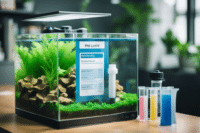Have you ever wondered what the perfect temperature is for your betta fish tank? Well, you’re not alone. Many fish enthusiasts, especially beginner fish keepers, are curious about providing the best environment for their finned friends. The ideal water temperature for betta fish is between 76 to 80 degrees Fahrenheit (24 to 27 degrees Celsius). This range is crucial for maintaining their health and well-being.
Betta fish, also known as Betta splendens or Siamese fighting fish, come from the warm, tropical climates of Southeast Asia, including countries like Thailand, Laos, and Cambodia. They thrive in the warm waters of rice paddies and slow-moving streams. Keeping their tank at the right temperature mimics their natural habitat, helping them stay active and vibrant.
Maintaining the right temperature can be a bit tricky, but with the right heater and thermometer, it’s totally doable. Making sure your betta’s tank stays within that sweet spot is one of the simplest ways to keep your fish happy and healthy. Plus, a stable environment prevents stress, which can lead to various health issues for these beautiful creatures.
Key Takeaways
- The ideal water temperature for betta fish is 76-80°F (24-27°C).
- Bettas are tropical fish from Southeast Asia and thrive in warm water.
- Use a heater and thermometer to maintain consistent tank temperature.
Understanding Betta Fish and Their Natural Habitat
Betta fish come from Southeast Asia, thriving in the tropical climate of countries like Thailand, Laos, and Cambodia. Their unique labyrinth organ helps them survive in these environments.
The Tropical Climate of Southeast Asia
Betta fish are native to the warm, tropical regions of Southeast Asia. Temperatures here often range between 75°F to 80°F (24°C to 27°C). This climate provides a stable environment that is perfect for bettas.
- Consistent Warmth: The tropical climate ensures that betta fish have a constant warm temperature, which is necessary for their well-being.
- Stable Conditions: The tropical environment also means the water temperature and conditions stay relatively stable, reducing stress for these fish.
Being from this warm region means betta fish need heated tanks to mimic their natural habitat.
Betta Fish in the Wild: Rice Paddies of Thailand, Laos, and Cambodia
In the wild, betta fish often live in shallow waters like rice paddies, ponds, and slow-moving streams. These waters are warm and can have varying levels of oxygen.
- Shallow Waters: The rice paddies provide a perfect shallow environment with plenty of space for bettas to swim and hide.
- Variable Oxygen Levels: These bodies of water can sometimes be low in oxygen, but bettas are equipped to handle this thanks to their special breathing organ.
In these natural environments, betta fish use their adaptability to thrive despite changes in water levels and quality.
The Labyrinth Organ: How Bettas Breathe
One unique feature of betta fish is their labyrinth organ. This organ allows them to breathe air directly from the surface.
- Adaptation: The labyrinth organ is crucial for survival in low-oxygen environments, like those found in their natural habitats.
- Surface Breathing: Betta fish often come to the surface to gulp air, which is why you might see them doing this in your tank.
This adaptation makes them more versatile and able to live in conditions that might be challenging for other fish. It’s also why they can survive in small, oxygen-poor environments temporarily.
Maintaining the Ideal Water Conditions for Betta Fish

Ensuring the proper water conditions for your Betta fish helps them thrive and stay healthy. This includes managing the water temperature, using the right equipment, and addressing any temperature-related health issues.
Ideal Temperature for Betta Fish Tanks
Betta fish thrive best in water temperatures between 76 to 80 degrees Fahrenheit (24 to 27 degrees Celsius). This range closely mimics their natural tropical environment in Southeast Asia.
Keeping the temperature stable is essential. Fluctuations can cause stress, lower their metabolism, and weaken their immune system, making them prone to diseases like fin rot and ich. Using an aquarium thermometer can help you regularly check the water temperature.
Equipment for Regulating Tank Temperature
Using a reliable aquarium heater is crucial for maintaining the ideal temperature range. When choosing a heater, consider the tank size. Larger tanks may require more powerful heaters to ensure even distribution of warmth.
There are different types of heaters:
- Submersible heaters
- In-tank heaters
- Inline heaters
Each type has its pros and cons, but submersible heaters are the most popular due to their efficiency and ease of use.
Don’t forget to invest in a good aquarium thermometer too. This will help you monitor the temperature consistently, ensuring it stays within the ideal range for your Betta.
Addressing Common Temperature-Related Betta Health Issues
Temperature fluctuations can lead to various health problems in Betta fish. Stress is one of the major issues, making your fish more susceptible to bacterial and fungal infections.
Sudden changes can cause temperature shock, where the fish becomes lethargic or shows signs of distress. To avoid this, always acclimate your Betta slowly to new water temperatures.
If the water is too cold, Bettas become sluggish, and their metabolism slows down, leading to digestive issues. Conversely, too warm water can lead to low oxygen levels, which is dangerous for Bettas. Regularly check your heater and thermometer to ensure your Betta’s environment is stable and healthy.
Conclusion
Keeping your betta fish happy and healthy means maintaining the right tank temperature.
Betta fish thrive in water temperatures between 76-80°F (24-27°C). This range mimics the warm, tropical climate of their natural habitat in Southeast Asia.
A consistent temperature within this range is key to your betta’s well-being. Temperatures outside of this range can stress your fish.
A reliable aquarium heater is a good investment. It helps to keep the temperature stable throughout the day.
Monitoring is crucial. Use an aquarium thermometer to regularly check the water temperature. This way, you can quickly spot any changes that might affect your fish.
If you ever notice your betta behaving oddly, check the water temperature first. It’s often the culprit when something seems off.
By keeping the water temperature just right, you ensure your betta fish stays active, healthy, and vibrant.
Thanks for reading, and happy fish-keeping!










